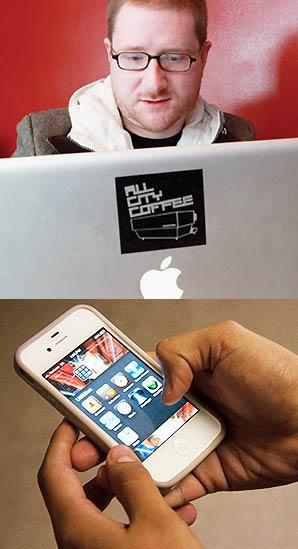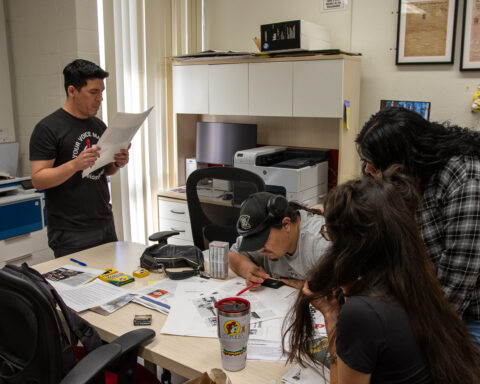 As Ruben Martinez, 21, walks from his car to the school’s entrance, he pulls out his phone, throws on his headphones and begins texting. With his eyes on his phone, headphones in his ears and his mind on his conversation, he just misses being hit by a car reversing out of its stall. “I won’t make that mistake again,” Martinez said as he put his phone in his pocket. But moments later, he’s back at it.
As Ruben Martinez, 21, walks from his car to the school’s entrance, he pulls out his phone, throws on his headphones and begins texting. With his eyes on his phone, headphones in his ears and his mind on his conversation, he just misses being hit by a car reversing out of its stall. “I won’t make that mistake again,” Martinez said as he put his phone in his pocket. But moments later, he’s back at it.
Martinez is one of a growing number of students addicted to technology. He can’t help it — he’s wired in.
About 70 percent of college students perform school work with the help of technological devices, and about 40 percent cannot go more than 10 minutes without reaching for a screen, according to an Edudemic.com survey.
“If you were an alien and you were watching, you would think that this [cell phone] is part of the human body. It has to be connected,” joked Sandra Wood, department chair of sociology and anthropology.
The technology we’re hooked into affects the addiction centers of the brain, Wood said.
Technology addiction has become so prevalent that California deemed April to be Distracted Driving Awareness Month, stepping up enforcement against texting motorists.
Drivers under 20 years old get into more distraction-related crashes than any other age group, said Santa Ana Police Department Cpl. Anthony Bertagna in a press statement.
But social skills are affected, too.
“I don’t remember the last time all my family sat at the dinner table,” said Sara Lewis, an El Modena high school student.
Family dinners help ease stress and improve social skills, said Gary Small, a UCLA psychiatrist.
Still, when families do eat together, cell phones are close by.
“It’s hard for someone like me at my age to see that interacting with a machine is better than interacting with other human beings,” Wood said.
The average person checks their phone at least 34 times a day at 10 minute intervals, not out of necessity but out of habit, according to a study in the journal Personal and Ubiquitous Computing.
“I think [cell phones] become an unconscious drain on your time and energy,” Wood said, addressing student concerns about time management.
With a smartphone in his pocket and a laptop in his bag, Martinez sees no end in sight.
“I look around more to make sure I don’t get hit but I’m still wrapped up,” Martinez said. “I doubt it’ll ever change. I love having the world at my fingertips.”
- TECH OBSESSED – A wealth of online data has created a new obsession compulsion in which people are searching and collecting data.
- ADDICTED – About 1 percent of psychology textbooks and college courses address Internet and tech addiction.
- PHONED-IN – On average, most check their cell phones 34 times a day. Check-ins often last less than 30 seconds and are within 10 minute intervals.
Source: Center for Internet Addiction.
- The two-party system is failing us. - October 19, 2024
- Read our Fall 2023 Print: Vol. 100 No. 1 - October 23, 2023
- Santa Ana College Awarded State Department of Finance Grant - April 2, 2015











